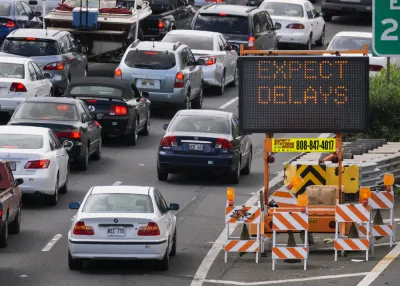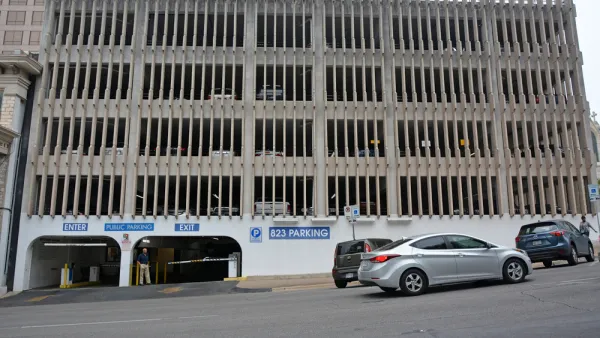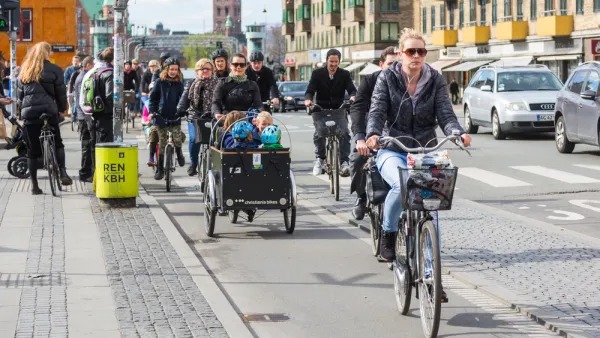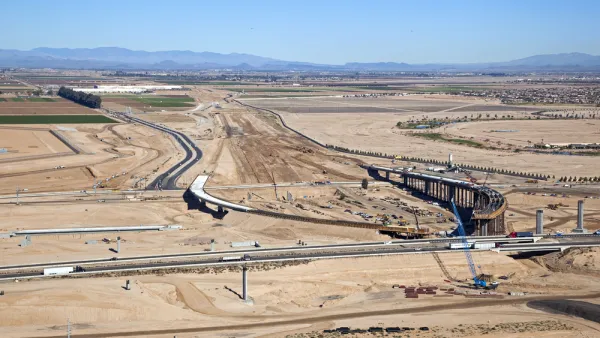Government played a big role in creating the car-centric United States that exists today. Climate change requires that government take the lead in reducing automobile dominance.

An article by Gabby Birenbaum poses the question in the headline, first summarizing the pressing need for Americans to drive less.
Data from the EPA shows that the transportation sector is actually the biggest source of pollution in the US, and that light-duty vehicles (or passenger cars) are responsible for 58 percent of those emissions.
Residents in the most urban areas, which theoretically should reduce per capita emissions by delivering the benefits of density: alternatives to automobile transportation and proximity to jobs. "According to a 2021 study published in Frontiers, Houston, Chicago, and Los Angeles have some of the highest per-capita emissions totals in the world," according to Birenbaum. "The study broke down cities’ emissions based on sector, using the most recently available data (from 2009 and 2010), and found a large portion of those emissions come from transportation."
Breaking the habit of driving to reduce carbon emissions is hard—despite the pressing need—because so many U.S. cities are built for driving. "Biking and walking are often not options, and public transit, where it exists, does not typically serve trips that do not involve going from a city’s outskirts to its downtown or back," writes Birenbaum.
Despite the depth and breadth of the challenge, Birenbaum focuses on the potential for local authorities to "create a safer, more democratized transportation ecosystem" and provide a significantly positive contribution to the effort to reduce carbon emissions. The prescriptions offered by Birenbaum, with more detail provided in the source article are: 1) Make streets safer for bikes and pedestrians, 2) end single family zoning to encourage mixed-use development, and 3) make drivers pay the cost of driving.
Notably, these prescriptions are seemingly diametrically opposed to the housing preferences of the majority of Americans according to the results of a post-pandemic survey by the Pew Research Center published earlier in the summer of 2021.
FULL STORY: How to end the American obsession with driving

Analysis: Cybertruck Fatality Rate Far Exceeds That of Ford Pinto
The Tesla Cybertruck was recalled seven times last year.

National Parks Layoffs Will Cause Communities to Lose Billions
Thousands of essential park workers were laid off this week, just before the busy spring break season.

Retro-silient?: America’s First “Eco-burb,” The Woodlands Turns 50
A master-planned community north of Houston offers lessons on green infrastructure and resilient design, but falls short of its founder’s lofty affordability and walkability goals.

Test News Post 1
This is a summary

Analysis: Cybertruck Fatality Rate Far Exceeds That of Ford Pinto
The Tesla Cybertruck was recalled seven times last year.

Test News Headline 46
Test for the image on the front page.
Urban Design for Planners 1: Software Tools
This six-course series explores essential urban design concepts using open source software and equips planners with the tools they need to participate fully in the urban design process.
Planning for Universal Design
Learn the tools for implementing Universal Design in planning regulations.
EMC Planning Group, Inc.
Planetizen
Planetizen
Mpact (formerly Rail~Volution)
Great Falls Development Authority, Inc.
HUDs Office of Policy Development and Research
NYU Wagner Graduate School of Public Service




























